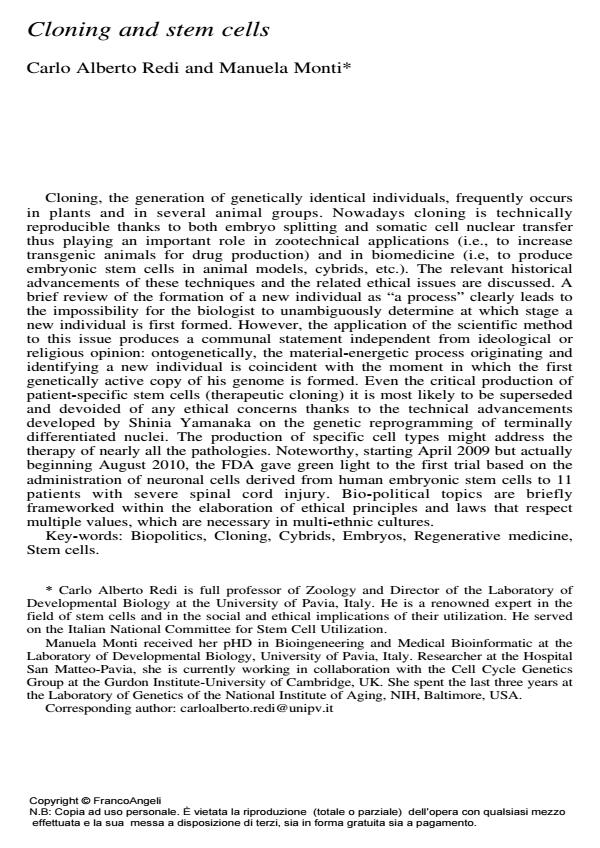Cloning and stem cells
Journal title SALUTE E SOCIETÀ
Author/s Carlo Alberto Redi, Manuela Monti
Publishing Year 2010 Issue 2010/En3
Language English Pages 18 P. 73-90 File size 300 KB
DOI 10.3280/SES2010-003006-ing
DOI is like a bar code for intellectual property: to have more infomation
click here
Below, you can see the article first page
If you want to buy this article in PDF format, you can do it, following the instructions to buy download credits

FrancoAngeli is member of Publishers International Linking Association, Inc (PILA), a not-for-profit association which run the CrossRef service enabling links to and from online scholarly content.
Cloning, the generation of genetically identical individuals, frequently occurs in plants and in several animal groups. Nowadays cloning is technically reproducible thanks to both embryo splitting and somatic cell nuclear transfer thus playing an important role in zootechnical applications (i.e., to increase transgenic animals for drug production) and in biomedicine (i.e, to produce embryonic stem cells in animal models, cybrids, etc.). The relevant historical advancements of these techniques and the related ethical issues are discussed. A brief review of the formation of a new individual as "a process" clearly leads to the impossibility for the biologist to unambiguously determine at which stage a new individual is first formed. However, the application of the scientific method to this issue produces a communal statement independent from ideological or religious opinion: ontogenetically, the material-energetic process originating and identifying a new individual is coincident with the moment in which the first genetically active copy of his genome is formed. Even the critical production of patient-specific stem cells (therapeutic cloning) it is most likely to be superseded and devoided of any ethical concerns thanks to the technical advancements developed by Shinia Yamanaka on the genetic reprogramming of terminally differentiated nuclei. The production of specific cell types might address the therapy of nearly all the pathologies. Noteworthy, starting April 2009 but actually beginning August 2010, the FDA gave green light to the first trial based on the administration of neuronal cells derived from human embryonic stem cells to 11 patients with severe spinal cord injury. Bio-political topics are briefly frameworked within the elaboration of ethical principles and laws that respect multiple values, which are necessary in multi-ethnic cultures.
Keywords: Biopolitics, Cloning, Cybrids, Embryos, Regenerative medicine, Stem cells
Carlo Alberto Redi, Manuela Monti, Cloning and stem cells in "SALUTE E SOCIETÀ" En3/2010, pp 73-90, DOI: 10.3280/SES2010-003006-ing